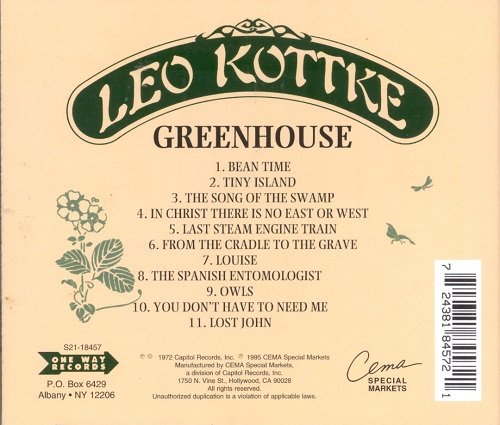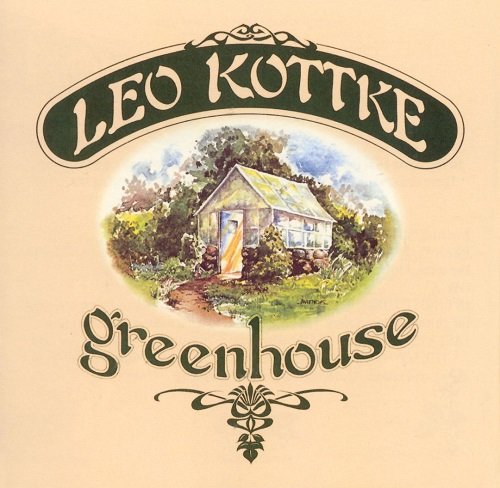
Leo Kottke - Greenhouse (Reissue) (1972/1995)
BAND/ARTIST: Leo Kottke
- Title: Greenhouse
- Year Of Release: 1972/1995
- Label: One Way Records
- Genre: Acoustic, Folk Rock
- Quality: Mp3 320 / Flac (tracks)
- Total Time: 36:37
- Total Size: 94/193 Mb
- WebSite: Album Preview

Tracklist:
1. Bean Time
2. Tiny Island
3. Song of the Swamp
4. In Christ There Is No East or West
5. Last Steam Engine Train
6. From the Cradle to the Grave
7. Louise
8. Spanish Entomologist
9. Owls
10. You Don't Have to Need Me
11. Lost John
Innovative acoustic guitar virtuoso Leo Kottke was born September 11, 1945, in Athens, GA. Raised in 12 different states, he absorbed a variety of musical influences as a child, flirting with both violin and trombone before trying his hand at the guitar at age 11. After developing a love for the country-blues of Mississippi John Hurt, Kottke lost much of the hearing in his left ear as a result of a mishap with a firecracker; during a later tenure in the Naval Reserve, his right ear suffered permanent damage during firing practice.
Discharged due to his impairment, Kottke entered college, dropping out after several years to hitchhike across the country as an itinerant musician. After settling in the Twin Cities area and becoming a fixture on the city's folk club circuit, he issued his 1969 debut LP, Twelve String Blues, recorded live at Minneapolis' Scholar Coffee House, on the tiny Oblivion label. After sending 1970's Circle 'Round the Sun to guitarist John Fahey, Kottke was signed by Fahey's manager Denny Bruce, who soon secured a deal with Capitol.
MudlarkKottke's 1971 major-label debut, Mudlark, positioned him somewhat uneasily in the singer/songwriter vein, despite his own wishes to remain an instrumental performer; in the liner notes to 1972's 6- and 12-String Guitar, issued on Fahey's Takoma label, he even described his own voice as "geese farts on a muggy day." Still, despite battles with label heads as well as with Bruce, Kottke flourished during his tenure on Capitol, as records like 1972's Greenhouse and 1973's live My Feet Are Smiling and Ice Water found him branching out with guest musicians and unusual song covers drawing on folk, rock, jazz, and bluegrass, all the while honing his propulsive fingerpicking mastery.
Chewing Pine With 1975's Chewing Pine, Kottke reached the U.S. Top 50 for the first time; he also gained an international cult following thanks to his performances at folk festivals the world over. With his 1976 self-titled release, he moved to the Chrysalis label, although sales diminished for LPs including 1978's Burnt Lips, 1979's Balance, and 1980's Live in Europe. After 1983's T-Bone Burnett-produced Time Step, Kottke's contract with Chrysalis ended, and he moved over to the independent Private Music label.
A Shout Toward NoonKottke's powerful technique, combined with his prolific output and extensive touring schedule, resulted in a lingering pain in his hands that began to hamper his playing in the middle of the 1980s. Consequently, the beginning of his tenure on Private Music coincided with the beginnings of a shift in technique closer to classical guitar performance; he also slowed his productivity, and after 1986's reflective A Shout Toward Noon, he did not re-enter the studio before recording Regards from Chuck Pink in 1988.
My Father's Face Simultaneously, Kottke cut back dramatically on his live schedule, settling comfortably into his role as a cult figure. He released an album annually from 1989 to 1991, following My Father's Face with That's What and finally Great Big Boy, which featured a guest appearance from Lyle Lovett. Two years later, Kottke returned with Peculiaroso, which featured production by Rickie Lee Jones. The solo One Guitar, No Vocals followed in 1999, but it was his collaboration with Phish bassist Mike Gordon, Clone, that caught audiences' attention in 2002. Kottke returned to the solo realm with 2004's Try and Stop Me, released on Bluebird. In 2005, Kottke collaborated with Phish bassist Mike Gordon on Sixty Six Steps.
Discharged due to his impairment, Kottke entered college, dropping out after several years to hitchhike across the country as an itinerant musician. After settling in the Twin Cities area and becoming a fixture on the city's folk club circuit, he issued his 1969 debut LP, Twelve String Blues, recorded live at Minneapolis' Scholar Coffee House, on the tiny Oblivion label. After sending 1970's Circle 'Round the Sun to guitarist John Fahey, Kottke was signed by Fahey's manager Denny Bruce, who soon secured a deal with Capitol.
MudlarkKottke's 1971 major-label debut, Mudlark, positioned him somewhat uneasily in the singer/songwriter vein, despite his own wishes to remain an instrumental performer; in the liner notes to 1972's 6- and 12-String Guitar, issued on Fahey's Takoma label, he even described his own voice as "geese farts on a muggy day." Still, despite battles with label heads as well as with Bruce, Kottke flourished during his tenure on Capitol, as records like 1972's Greenhouse and 1973's live My Feet Are Smiling and Ice Water found him branching out with guest musicians and unusual song covers drawing on folk, rock, jazz, and bluegrass, all the while honing his propulsive fingerpicking mastery.
Chewing Pine With 1975's Chewing Pine, Kottke reached the U.S. Top 50 for the first time; he also gained an international cult following thanks to his performances at folk festivals the world over. With his 1976 self-titled release, he moved to the Chrysalis label, although sales diminished for LPs including 1978's Burnt Lips, 1979's Balance, and 1980's Live in Europe. After 1983's T-Bone Burnett-produced Time Step, Kottke's contract with Chrysalis ended, and he moved over to the independent Private Music label.
A Shout Toward NoonKottke's powerful technique, combined with his prolific output and extensive touring schedule, resulted in a lingering pain in his hands that began to hamper his playing in the middle of the 1980s. Consequently, the beginning of his tenure on Private Music coincided with the beginnings of a shift in technique closer to classical guitar performance; he also slowed his productivity, and after 1986's reflective A Shout Toward Noon, he did not re-enter the studio before recording Regards from Chuck Pink in 1988.
My Father's Face Simultaneously, Kottke cut back dramatically on his live schedule, settling comfortably into his role as a cult figure. He released an album annually from 1989 to 1991, following My Father's Face with That's What and finally Great Big Boy, which featured a guest appearance from Lyle Lovett. Two years later, Kottke returned with Peculiaroso, which featured production by Rickie Lee Jones. The solo One Guitar, No Vocals followed in 1999, but it was his collaboration with Phish bassist Mike Gordon, Clone, that caught audiences' attention in 2002. Kottke returned to the solo realm with 2004's Try and Stop Me, released on Bluebird. In 2005, Kottke collaborated with Phish bassist Mike Gordon on Sixty Six Steps.
Oldies | Folk | Rock | FLAC / APE | Mp3
As a ISRA.CLOUD's PREMIUM member you will have the following benefits:
- Unlimited high speed downloads
- Download directly without waiting time
- Unlimited parallel downloads
- Support for download accelerators
- No advertising
- Resume broken downloads


